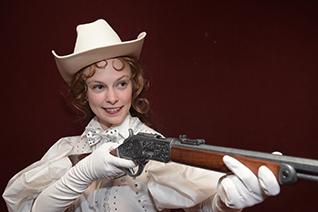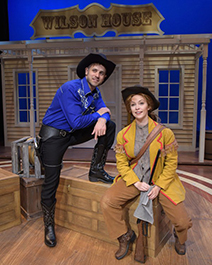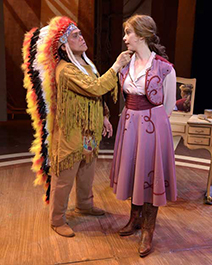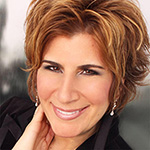Annie Get Your Gun
Westchester Broadway Theatre, Elmsford, NY, October 30, 2017
Reviewed by Chip Deffaa for Cabaret Scenes
Photos by John Vecchiolla

Few musicals boast scores as rich, rewarding, and just plain delightful as that of Irving Berlin’s timeless Annie Get Your Gun, which is playing through January 28, 2018 (with time off in December for a holiday show) at the Westchester Broadway dinner theater. It’s a glorious score, with big, rousing numbers like “I Got the Sun in the Morning” and “There’s No Business Like Show Business,” superb ballads like “The Girl That I Marry” and “I Got Lost in His Arms,” and some of the greatest duets in the musical-theater canon: “Anything You Can Do,” “They Say It’s Wonderful,” and the irresistible “An Old Fashioned Wedding” (added to the original score for the 1966 revival).
And the libretto, by Herbert and Dorothy Fields about Annie Oakley and her rivalry/romance with fellow sharpshooter Frank Butler, set against the colorful backdrop of Buffalo Bill’s Wild West Show is engaging. There’s a great deal to like, for audience members of all ages, in the Westchester production, directed and choreographed by Richard Stafford. This is the 202nd production at this venerable dinner theater, and it’s one of the most satisfying productions I’ve seen there. Stafford understands well “Golden Age” musicals like this one; the story is told clearly and charmingly. (And a bit of tap dancing on suitcases is good fun.) And he’s put together a solid, exuberant, and appealing cast.

Devon Perry—whom I enjoyed very much when she starred in The Wizard of Oz at this theater—is appropriately spunky, sure of herself, and engaging as Annie Oakley. Her heartfelt renditions of the ballads work well. And she and Adam Kemmerer (as Frank Butler) get thoroughly into the spirit of the duets, from “Anything You Can Do” to “An Old Fashioned Wedding.” (No, Devon Perry is not going to erase my memories of Ethel Merman starring in the 1966 Broadway revival; the galvanic Merman delivered one of the strongest, most memorable stage performances I’ve ever witnessed. But Perry is an appealingly warm, confident Oakley and she “gets” the great songs she’s been given to sing.) Kemmerer has the right kind of deep, resonant voice the role of Frank Butler requires, and there’s a good onstage chemistry between him and Perry. He hasn’t yet found all of the riches to be mined in his solo number—they’re such great songs—but he’s very likable.

The two leads get fine support from such seasoned pros as Kilty Reidy (I warmed to him as Charlie Davenport) and Marshall Factora (terrific presence and authority as Chief Sitting Bull). This is a show the whole family can enjoy.
One minor complaint. The original material has been “updated” here and there—needlessly, I think—in the name of political correctness. For example, in the high-spirited number “Colonel Buffalo Bill,” Buffalo Bill is no longer described as having fought off “Indians” but “hooligans”—which sounds a little silly (and wrong for the era). Irving Berlin did not write “hooligans”— he wrote “Indians.” I think the original lyrics could—and should—have been left alone. The song “I’m an Indian, Too” has been cut from the score. And the scene showing the sharpshooting-match between Oakley and Butler has been modified just a bit to emphasize that gals and guys are equals, and will be equal partners in life. These changes are well-intended, but this classic musical comedy—a fun show, with plenty of heart and good cheer—wasn’t broken, and didn’t need this kind of fixing.





